
On this International Day of the Victims of Enforced Disappearances, PBI recognizes the challenges that victims of enforced disappearances face and we also celebrate their resilience.
Enforced disappearance occurs when people are abducted and their whereabouts remain unknown. It is a crime against humanity that has devastating effects on the victims, their families and entire communities. Disappearance is a multiple and continuous human rights violation that continues every day until the whereabouts of the missing person is known, and as such the suffering of a relative of the disappeared is also perpetual. Enforced disappearance has not only been a tool of past dictatorships but is a tool that continues to be used to this day, resulting in tens of thousands of disappeared persons in countries where PBI carries out its work.
Kenya: Police killings and disappearances in Nairobi's Mathare Valley
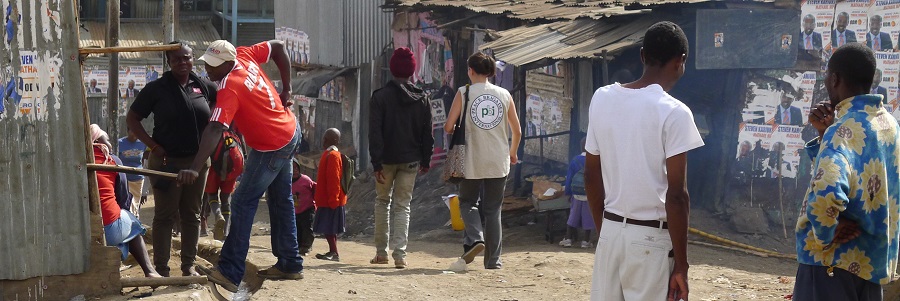
On June 23, 2016, Willie Kimani, Josephat Mwenda, and Jospeh Muiruri went missing after leaving a court appointment. None of them were seen until one week later when their bodies were retrieved from a river showing signs of extensive torture. Eyewitnesses reported seeing a police cruiser following their taxi from the court and on July 18, 2016, four police officers were charged with the murder of the three victims.
Willie Kimani was a human rights lawyer working with the International Justice Mission. He was attending a court appointment with his client, Josephat Mwenda, and Joseph Muiruri drove the taxi the two caught after the appointment. Kenyan organizations, like PBI partner Mathare Social Justice Centre (MSJC), point out that cases like these are a part of a greater pattern of extrajudicial executions by Kenyan police forces. The Independent Medico-Legal Unit recorded 97 such cases in 2015 alone and this is likely to be an underestimation, considering the lack of reporting.
PBI Kenya works closely with grassroots human rights defenders in the informal settlements of Nairobi who are working on cases of extrajudicial killings and forced disappearances by the police. One of the defenders we accompany, Ms. Ruth Mumbi, lost her brother-in-law Stephen Gichuru Mwihaki in an extrajudicial killing in May 2015. Stephen was only seventeen-years-old. MSJC, our partner organisation in Mathare, is currently setting up a campaign to document and publicize extrajudicial killings in the informal settlements.
Colombia: Ongoing threats for relatives searching for justice
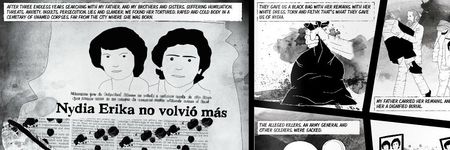
Andrea Torres Bautista is a Colombian lawyer and human rights defender with the human rights organization Fundación Nydia Erika Bautista (FNEB). Andrea’s aunt, Nydia Erika, was disappeared in 1987 and Andrea has since sought justice for the disappearance, eventually becoming a lawyer and representing many other victims of enforced disappearances. She has faced threats and harassment for the work she carries out. On June 24, 2015, Andrea received a threatening phone call. The voice on the phone said:
“[…] didn’t you understand that you should stop bothering us, we are going to kill you, but first we will rape you so that you respect men”
In 2016, PBI Colombia produced The White Dress, a graphic novel recounting the story of Nydia Erika Bautista and her family’s struggle for justice. PBI provides protective accompaniment to Andrea and the victims she represents.
Guatemala: Conflict era cases breaking the wall of impunity
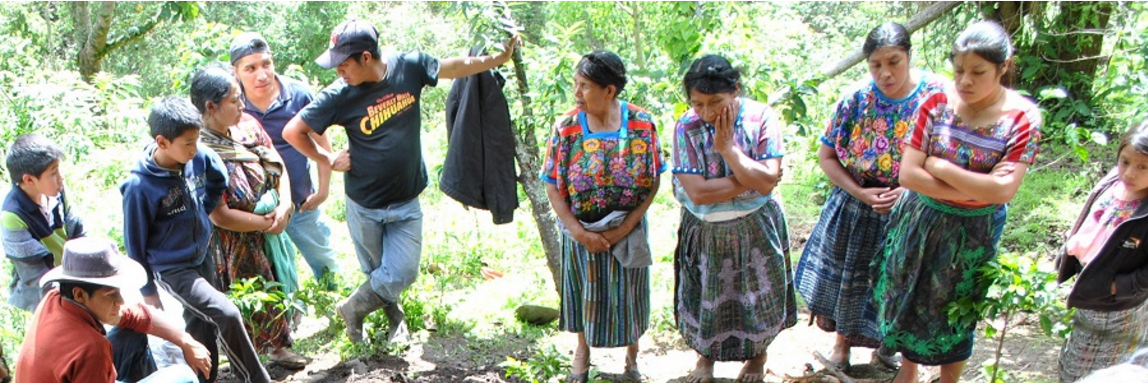
More than 45,000 people were reported as disappeared during Guatemala’s 36-year internal armed conflict. August 31, 2016 marks seven years since the historic sentence condemning Felipe Cusanero to 150 years in prison for the crime of enforced disappearance. The sentence was a watershed moment for transitional justice in Guatemala as it was the first case in which a defendant was prosecuted for the crime of enforced disappearance. The trial paved the way for other transitional justice cases in Guatemala including cases that are ongoing today such as: Theissen Molina and CREOMPAZ, which has been described as the biggest case of enforced disappearance in Latin America.
PBI provides trial observation and protective accompaniment to victims groups as well as to Edgar Perez Archila and the lawyers of the Human Rights Law Firm who litigated the Cusanero case and represent the victims in CREOMPAZ. Lawyers, victims and justice advocates in Guatemala continue to face harassment and threats for the work they do fighting impunity for enforced disappearance and other serious human rights violations.
Mexico: Ayotzinapa two years on - still no justice, still no truth
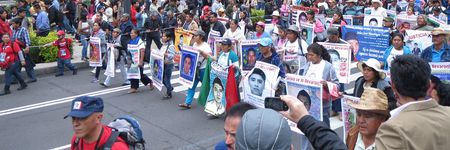
September 26, 2016 will mark two years since the enforced disappearance of 43 students from Ayotzinapa, Mexico. On July 29, 2016, after meetings in Washington D.C. between the Inter-American Commission on Human Rights, the Mexican government, the families of Ayotzinapa, and the organizations that accompany them, the Special Follow-Up Mechanism was approved to proceed with the investigation and locate the 43 students. To accompany this initiative, the Mexican Secretary of the Interior accepted the creation of a group within the Federal Police which will be exclusively devoted to protecting the relatives of the students who will carry out searches for their loved ones.
In Mexico, enforced disappearances are widespread with government figures reporting over 27,000 people missing or disappeared. A bill proposal for a general law on disappearances is currently under discussion between the federal government, legislative bodies and civil society.
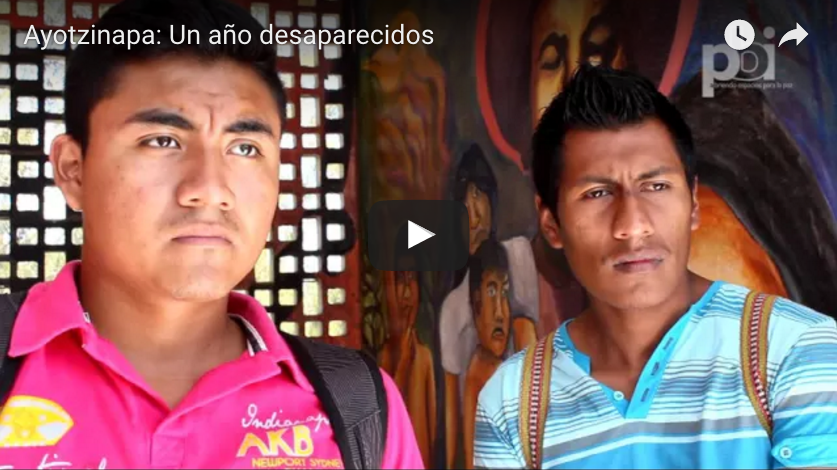 Recently, lawyers from PBI-USA’s Lawyers’ Committee on Human Rights, the Boston University human rights clinic, and American University Washington College of Law human rights clinic travelled to northern Mexico to investigate the issue in that part of the country of both Mexicans and migrants from other countries trying to make their way across the Mexican border. For 10 days, on two separate occasions in October 2015 and April 2016, lawyers from the U.S. met with NGOs, high-level government officials, migrant shelters, and collectives of family members working to file requests to open investigations for information from the government. The delegation will travel next to Honduras and Guatemala before producing a report that will cover the general problem of disappearances in Central America, focusing primarily on migrants and highlighting the various theories behind the causes and potential remedies for those missing both inside and outside of the borders of their home country. In additional to the report, lawyers from the U.S. will provide support to human rights defenders who have exhausted all avenues for a potential domestic remedy and are interested in bringing their case before an international human rights body.
Recently, lawyers from PBI-USA’s Lawyers’ Committee on Human Rights, the Boston University human rights clinic, and American University Washington College of Law human rights clinic travelled to northern Mexico to investigate the issue in that part of the country of both Mexicans and migrants from other countries trying to make their way across the Mexican border. For 10 days, on two separate occasions in October 2015 and April 2016, lawyers from the U.S. met with NGOs, high-level government officials, migrant shelters, and collectives of family members working to file requests to open investigations for information from the government. The delegation will travel next to Honduras and Guatemala before producing a report that will cover the general problem of disappearances in Central America, focusing primarily on migrants and highlighting the various theories behind the causes and potential remedies for those missing both inside and outside of the borders of their home country. In additional to the report, lawyers from the U.S. will provide support to human rights defenders who have exhausted all avenues for a potential domestic remedy and are interested in bringing their case before an international human rights body.
The families of the 43 students, the current students of the School of Ayotzinapa and the organizations that accompany them – among them Tlachinollan whose members receive PBI accompaniment – have suffered intimidation and threats. Tlachinollan representatives will participate in an advocacy tour in Washington, D.C. in October 2016.
Honduras: Ongoing killings and disappearances of LGBTI+ activists

Erick Alex Martínez Ávila was a student leader, journalist, human rights activist and member of the LGBTI+ Kukulcán collective. He was also an active member of the Roundtable for Sexual Diversity of the National Popular Resistance Front. Erick was found dead on May 7, 2012 with signs of strangulation, after having disappeared two days earlier. He had taken part in a demonstration on May 1st where he had handed out copies of a magazine expressing strong opposition to the Honduran coup d’état of 2009.
In February 2016, PBI Honduras put out an international alert following the killings of five LGBTI+ activists. From 2009 to 2016 there were more than 200 recorded murders of members the LGBTI community. Not only are the numbers of violent deaths alarming, but the number of cases that remain unpunished also demonstrates the lack of investigations coordinated by the state. Of the more than 200 cases recorded only 33 have been prosecuted.
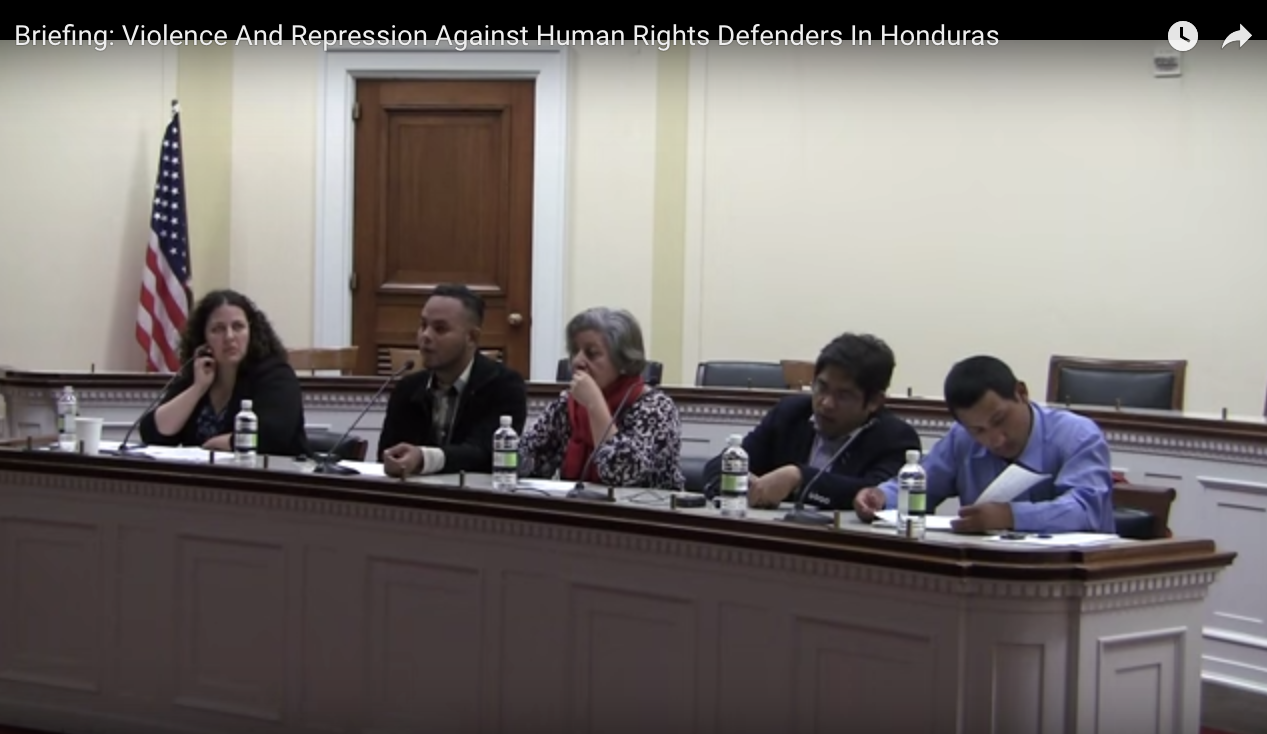 In April 2016, members of Arcoiris travelled to Washington, DC with PBI's support to participate in the Inter-American Commission on Human Rights Sessions and participate in a Congressional Briefing: The U.S. Policy Response to Violence and Repression Against Human Rights Defenders in Honduras. The briefing can be seen here.
In April 2016, members of Arcoiris travelled to Washington, DC with PBI's support to participate in the Inter-American Commission on Human Rights Sessions and participate in a Congressional Briefing: The U.S. Policy Response to Violence and Repression Against Human Rights Defenders in Honduras. The briefing can be seen here.
PBI provides protective accompaniment to Asociacion Arcoiris, which works with LGBTI communities at risk.

